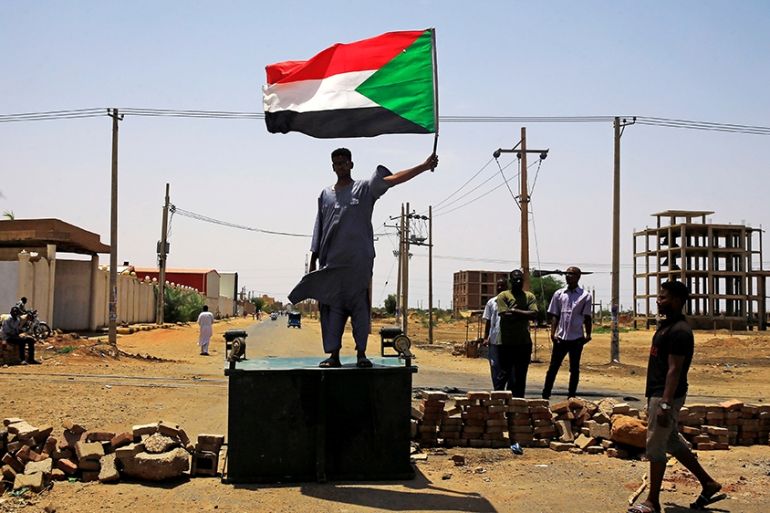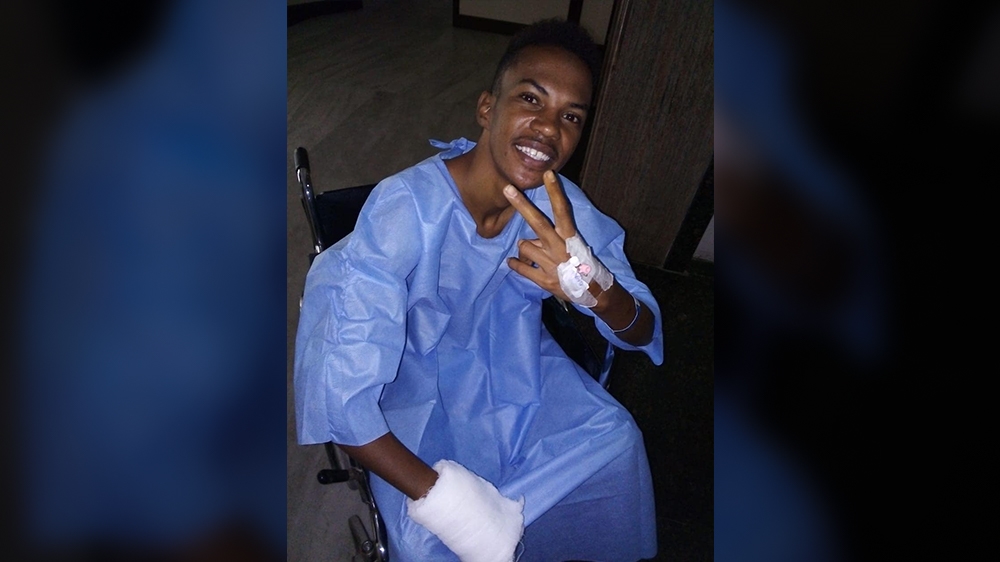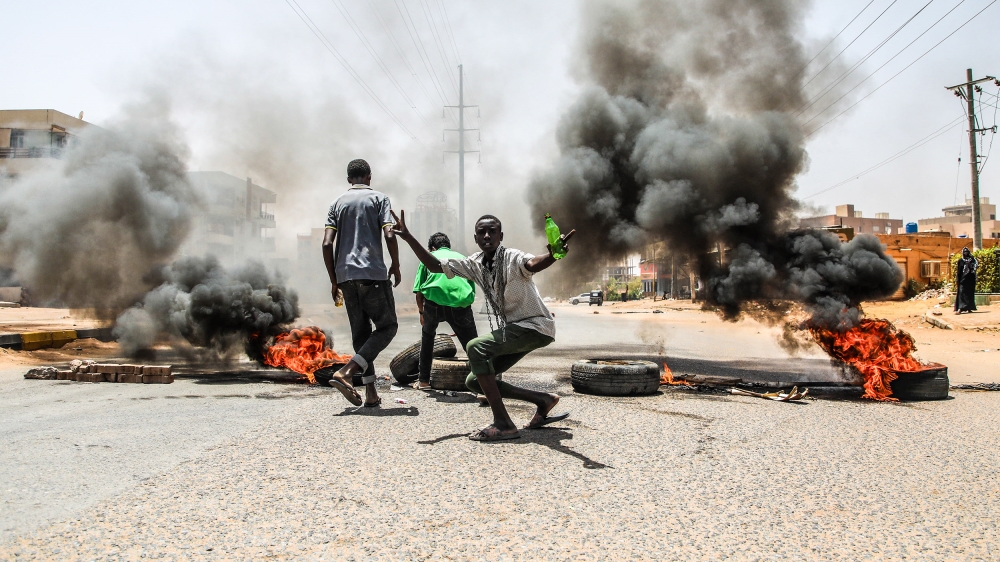‘The diaspora is key in helping stabilise a better Sudan’
Sudanese communities living abroad stepped in to help injured protesters and pledge further support in transition phase.

Abubaker Abdelmonem Alfadlaby woke up from surgery on December 21, 2018, to find three of his fingers missing.
Three days earlier, during a protest at the University of Khartoum, the 23-year-old student was hit with a tear gas canister launched by security forces.
He picked the canister up to throw it away from himself and the crowd.
“But it ended up exploding in my hand,” he told Al Jazeera by phone. “I accepted my destiny, because it happened for my country.”
Protests across Sudan were just beginning then, over the rising costs of bread and fuel.
The rallies eventually led to the removal of Omar al-Bashir as president and the establishment of a transitional government.
But protesters were often met with force in the way of tear gas and sometimes live ammunition.
In total, since late last year, more than 200 people have been killed and over 1,000 were injured.
The diaspora is key in helping stabilise a better Sudan. People have gone as far as vowing to give up their month's salary - or a regular amount monthly - it's been inspiring to see.
Despite a signed accord for a power-sharing between the Transitional Military Council (TMC) and an alliance of opposition groups in early July, the crackdown by security forces continued.
In late July, five schoolchildren at a rally were shot dead in the city of El-Obeid, once again igniting nationwide protests.
The head of the TMC, General Abdel Fattah al-Burhan, said the killings are “unacceptable”.
Alfadlaby was rushed to hospital where he was immediately taken into surgery. But the hospital lacked the needed equipment to save his fingers. That was when Sudanese doctors outside of the country and local activist Nazim Sirag got involved.
After hearing his story, they arranged treatment in India.

Soon, a worldwide fundraising campaign rose up to help other injured protesters in Sudan; for many, the support from outside has been life-saving.
When protests began, the Sudanese diaspora launched charities to provide critical items such as food and medical equipment – to date raising hundreds of thousands of dollars through various campaigns.
Contributions exploded after Sudanese security forces attacked a sit-in site at the military headquarters on June 3, killing more than 100 and injuring hundreds more.
After the June 3 attack, medical facilities came under attack, underscoring the need for urgent assistance.
Alfadlaby’s travel and medical costs were funded by the University of Khartoum Alumni Association in North America (UOKANA), which works with organisations and volunteers inside Sudan to reach individuals who have limited to no access to medical care.
“One of our first fundraisers was called Support Sudan Uprising, which started December 20, a couple of days after the uprising started. We collected $104,000 in about a month,” Bakri Ahmed Ali, a volunteer with UOKANA, told Al Jazeera.

Alfadlaby arrived in India in March.
“Without their support, it would have been very difficult for me to get the treatment I needed, they helped me a lot,” he said.
He underwent six, ultimately unsuccessful, surgeries to try and recover his fingers. In the end, his hand was amputated.
But he avoided infections, something he feared was more likely in Sudan.
“I felt much more comfortable and confident with the treatment in India,” he said.
UOKANA covered all of his expenses, including the final stage – a prosthetic hand.
“We’ve helped with very expensive medical treatment and surgeries such as prosthetic arms,” said Ali, referring to other Sudanese nationals the group has helped. “These treatments can reach $15,000. We support [victims] for as long as they have to stay. We provide monthly living expenses and we support a family member of theirs to be with them.”

In Alfadlaby’s case, his brother was able to join him in India.
“The number of injured is in the thousands, so it’s very expensive to treat them all, so these fundraisers have been key,” explained Ali.
In another example, a youth-led fundraiser launched after the June 3 attack has so far raised more than $65,000, with more than $20,000 flooding in the week after the violence.
Sudanese-American Ali Yousuf, a 25–year-old from Minnesota, participated in this initiative – he has been collaborating with Minnesota-based non-profit organisation The Sound Heart to provide humanitarian and medical assistance to people in Sudan.
These efforts will continue and multiply in the transition to democratic reforms.
“We also sponsor orphanages in Sudan and support them with all expenses. When the protests started … The Sound Heart started working with protesters to cover medical fees, medical supplies and everyday essentials,” Yousuf told Al Jazeera.
For Yousuf, the act of charity is about more than raising money. It also shines a light on the conflict.
“The goal of my fundraising efforts is to raise money and increase awareness, so I know that I must target both Sudanese and non-Sudanese people to achieve this,” he said.
Online campaigns have allowed the diaspora and non-Sudanese supporters to get involved.
The digital world allows the diaspora “to tell the world about Sudan,” said UOKANA’s Ali, “to take it beyond the fundraising and tell people about Sudan and change the image of Sudan that’s been inherited from the former regime.”
To rebuild Sudan into a civilian-led democracy, the diaspora is key to the current transition period, activists and analysts said.
‘We’ve still got a long way to go’
For more than 40 years, Sudanese people have been migrating.
There is no concrete data on the Sudanese diaspora, but Sudan’s government estimates that about five million live abroad – from the Middle East to North America.
Years of civil war, inadequate education and decades of economic instability are among the reasons people leave.
After the fall of al-Bashir, some have returned, including from self-imposed exile.
“The Sudanese diaspora are … realising they have a role to play. The diaspora is key in helping stabilise a better Sudan,” said Ali. “People have gone as far as vowing to give up their month’s salary – or a regular amount monthly – it’s been inspiring to see.”
During the protests, the diaspora called on local politicians for support.
“In the US, for instance, Sudanese protested in front of the White House and the Capitol building. They reached out to their Congress representatives, and created solidarity groups with doctors in Sudan to exchange medical knowledge and technologies,” said Amal Hassan Fadlalla, an associate professor at the University of Michigan.
“These efforts will continue and multiply in the transition to democratic reforms.”
Back in Khartoum, as Alfadlaby learned to use his prosthetic hand, he reflected on the sacrifices demonstrators have made.
If he could send a message to the people of Sudan, it would be: “Don’t allow the martyrs’ blood be in vain.
“We’ve still got a long way to go.”
